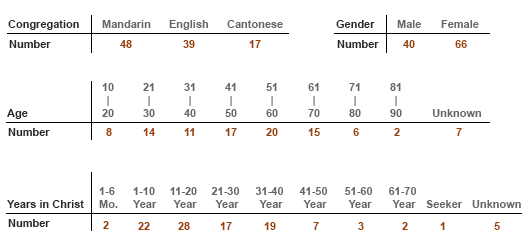In this issue of the Grace Word’s special report on the topic of suffering, the team conducted interviews on CGBC parish members. Two specific questions were asked:
1. How do you handle/face suffering or hardship?
2. How would you like others to help you in your time of suffering?
Over a hundred churchgoers from all three congregations were interviewed in order to obtain a better understanding of the thoughts of our members and seekers on these searching questions. There were a greater proportion of sisters than brothers who agreed to be interviewed. The respondents covered all ages, but mostly were over 40 years old. The majority has believed in the Lord for many years. The following charts explain respondents’ demographics.
The willing participation of brothers and sisters during the interview process was cordial, and many candid responses were received on a very broad and personal subject. The three congregations worship at different times in different languages on Sundays and partake in separate fellowships, and would oftentimes feel that their cultural background, ideas or values are different. However, most of the answers in the interview process were surprisingly similar.
The following is a summary of answers to the first question on how to deal with hardships provided by the interview respondents.
1. Prayer: Whether on their own or asking people to pray for them, it was the majority’s response (n=58). Brother Wang Cheng of the Mandarin Ministry declared that his life was spared through prayer. Many people are able to find calmness through prayer; it allows them to compose themselves to better deal with the suffering.
2. Talking / Listening: In general, people confide only with their spouse, close family members or trusted friends, wanting mainly their listening ears. Some prefer that people talk less and listen more while others prefer the advice or counsel of friends who have had similar experience in the matter. For example, sister Peng of the Mandarin congregation would seek her friends’ help to objectively decipher her dilemma.
3. Time and Space: Some male and female respondents (n=13) said that they do not seek help, for they need personal space and time to manage on their own. Brother Kim of the Mandarin congregation said that he does not seek help because it is not easy for others to help him. Some people would begin to share with others after spending some private time alone. Brother Asa Ma of the English congregation recollected: “Before talking to others, I take some time alone, just be alone with my thoughts to process the whole situation.”
4. Acceptance: Christians would take on a more proactive stance when confronting suffering. Although initially strong emotions are encountered, they would calm themselves through prayer, Bible verses and Church hymns (n=10). Some people would ask the “why” question, seeking to find meaning behind all the suffering. Others may try to rationalize the affliction of suffering, or even make comparisons so that their own hardship would not appear too grave and find comfort. Brother Sonny Lee of the English congregation admits that sometimes one could not comprehend why we suffer, but he acknowledges God’s sovereignty, and that He is at work. He uses Daniel’s faith in the Old Testament as his role model to help him come to grips with sufferings. Brother James from the Cantonese congregation shared that he is more willing to accept suffering after becoming a Christian, but finds it hard to appreciate God’s timing.
“Helping others is the foundation of happiness.” This is a familiar truth. We’re altruistic by nature, and wish to help others, and in the process bring happiness to ourselves. However, caution should be taken into consideration so that our enthusiasm does not cause more trouble to the recipient. The following is a summary of answers to the second question on the preferred help from others in times of suffering.
1. Praying for me: Fifty-eight people mentioned prayer, and a fair percentage said that by simply praying for them was enough, and need not pray with them. Anita Wu of the Cantonese congregation said that in addition to prayer, she hoped that others would bring comfort to her through church hymns because she used hymns to bring comfort to others. Sister Pauline Wan from the same congregation mentioned that she encourages her friends to share with her the words from the Scripture because they gave her strength.
2. Talking / Listening: Most people would only confide with close friends, and request that they talk less and listen more. If you needed to say something, citing from the Scripture or God’s words or hymns is sufficient comfort. An interesting phenomenon was that ten brothers from the English ministry preferred to just have others listen–the largest number from both men and women surveyed in all three congregations.
3. Practical Help: Several respondents emphasized that when the body is suffering from sickness and in great pain, practical assistance would be appreciated.
4. Companionship: The emphasis is not to provide answers but companionship without much talking.
5. Do not Disturb, Please: Although few in number, there’s the same proportion of brothers and sisters requesting quiet time and space, and simply pray for them. This was most evident in the female respondents of the Mandarin congregation.
6. Active Concern: Some respondents wanted others to know of their difficulties, and take the initiative of concern. Interestingly, they were all brothers, and half belongs to the younger age groups.
So, what do the data indicate? What conclusions can be drawn? This homemade survey does not meet the academic standards, and the results certainly do not represent the position of the Church. It is the intent of the Gracious Words to simply provide some information as reference for its readers through these interviews. Evidently, the answers to the above two questions are similarly identical. A logical inference is that respondents at CGBC apply the teaching of Matthew 7:12 “So in everything, do to others what you would have them do to you, for this sums up the Laws and the Prophets.”
Great appreciations go to all the brothers and sisters who graciously participated in sharing their views. Their sincere and genuine answers reflect an unpretentious and honest Christian who shows grace and humility as seen in George Yee’s sharing. Yee, who has led a Christian life for 50 years, expressed in earnest that it was not easy for him to face his own suffering, and he needed time and space to be alone. He prefers people to just pray for him, but not necessarily pray with him. During the interview process, many spiritual elders from all three congregations who are worthy of emulation provided much encouragement and advices. Just as Paul is a model to the Philippian Christians, they also influence our lives by their spiritual maturity (Philippians 3:17).


Leave a Reply